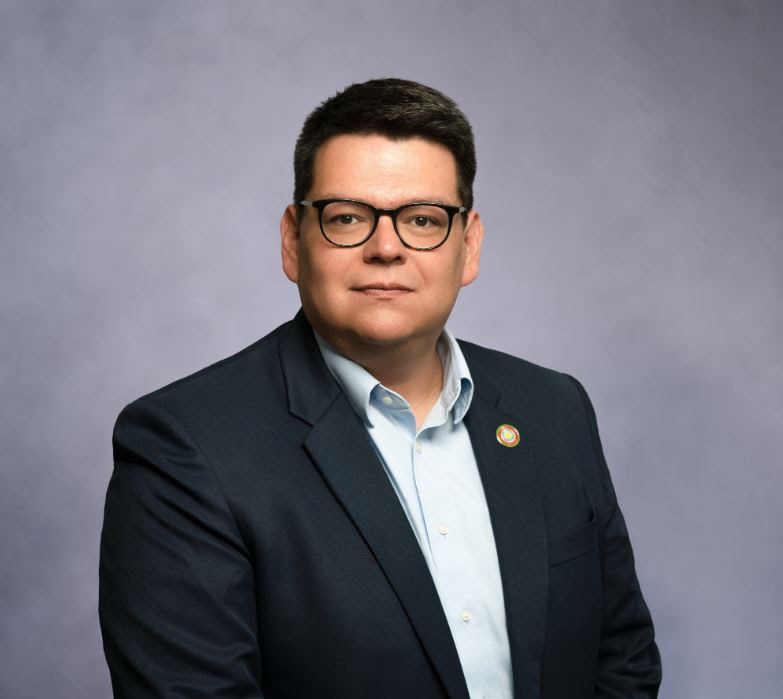
- Details
- By Native News Online Staff
The Native American Finance Officers Association (NAFOA) has hired Cory M. Blankenship (Eastern Band of Cherokee Indians) as its new executive director. He will officially assume the role on September 30, 2024.
“We couldn’t be more thrilled that Cory has decided to bring his talents to NAFOA. He has a unique understanding of the challenges and opportunities facing our organization,” NOFOA’s president Chairman Rodney Butler (Mashantucket Pequot Tribal Nation) said. “His extensive background in tribal finance and governance, combined with his experience with nonprofits, positions him to effectively lead NAFOA. We are confident in his ability to steer the organization forward and amplify its impact on Indian Country.”
Blankenship brings over 17 years of experience in tribal finance, non-profit, and philanthropic sectors to NAFOA.
“NAFOA has been instrumental in shaping my career as a tribal finance professional,” Blankenship said. “Serving NAFOA and its member tribes as its Executive Director is truly an honor and privilege.”
Blankenship’s career reflects a strong dedication to serving both his Tribe and Indian Country. Most recently, he served as Community Investment Officer at the Dogwood Health Trust concentrating on fostering economic opportunities tied to social determinants of health. Prior to that, he was the Secretary of the Treasury for the Eastern Band of Cherokee Indians (EBCI) for six years, overseeing financial operations, directing investments, and spearheading economic diversification initiatives.
He has also contributed his leadership to several boards and committees, including the Tribal Planning Board and EBCI Holdings LLC, an entity focused on economic diversification, as well as local non-profit boards supporting his tribal community and surrounding areas. Over his nearly 12-year tenure with the Eastern Band of Cherokee Indians, he has held key positions as Tribal Treasurer and Finance Director, driving essential financial and strategic initiatives. His work in finance and governance naturally led to his involvement with NAFOA, where he found crucial support and resources that advanced his career and strengthened his ability to serve his Tribe.
“I am excited to give back to the community that has supported my growth,” he expressed. “I look forward to using my skills and experiences to advance the organization’s mission to grow tribal economies, strengthen educational resources, and support tribal sovereignty.”
Blankenship holds a Bachelor of Arts in Political Science from North Carolina State University, a Master of Public Affairs from Western Carolina University, and a Master of Jurisprudence in Federal Indian Law from the University of Tulsa College of Law. In 2019, he received the 40 Under 40 award from the National Center for American Indian Enterprise Development. He and his wife, Jade (Colville Confederated Tribes), reside in the Big Cove Community of the Qualla Boundary (Cherokee Indian Reservation) with their five sons.
Blankenship assumes the position of Executive Director succeeding Susan Masten (Yurok Tribe), who served as Interim Executive Director since June 2023.
More Stories Like This
Native News Weekly (August 25, 2024): D.C. BriefsUS Presidents in Their Own Words Concerning American Indians
Indigenous Actor Elaine Miles Reports Detention by Alleged ICE Agents
Happy Thanksgiving from Native News Online
Coming Up on Native Bidaské: Behind the Animation: Joey Clift Talks “Pow” and Native Storytelling
Help us tell the stories that could save Native languages and food traditions
At a critical moment for Indian Country, Native News Online is embarking on our most ambitious reporting project yet: "Cultivating Culture," a three-year investigation into two forces shaping Native community survival—food sovereignty and language revitalization.
The devastating impact of COVID-19 accelerated the loss of Native elders and with them, irreplaceable cultural knowledge. Yet across tribal communities, innovative leaders are fighting back, reclaiming traditional food systems and breathing new life into Native languages. These aren't just cultural preservation efforts—they're powerful pathways to community health, healing, and resilience.
Our dedicated reporting team will spend three years documenting these stories through on-the-ground reporting in 18 tribal communities, producing over 200 in-depth stories, 18 podcast episodes, and multimedia content that amplifies Indigenous voices. We'll show policymakers, funders, and allies how cultural restoration directly impacts physical and mental wellness while celebrating successful models of sovereignty and self-determination.
This isn't corporate media parachuting into Indian Country for a quick story. This is sustained, relationship-based journalism by Native reporters who understand these communities. It's "Warrior Journalism"—fearless reporting that serves the 5.5 million readers who depend on us for news that mainstream media often ignores.
We need your help right now. While we've secured partial funding, we're still $450,000 short of our three-year budget. Our immediate goal is $25,000 this month to keep this critical work moving forward—funding reporter salaries, travel to remote communities, photography, and the deep reporting these stories deserve.
Every dollar directly supports Indigenous journalists telling Indigenous stories. Whether it's $5 or $50, your contribution ensures these vital narratives of resilience, innovation, and hope don't disappear into silence.
 The stakes couldn't be higher. Native languages are being lost at an alarming rate. Food insecurity plagues many tribal communities. But solutions are emerging, and these stories need to be told.
The stakes couldn't be higher. Native languages are being lost at an alarming rate. Food insecurity plagues many tribal communities. But solutions are emerging, and these stories need to be told.
Support independent Native journalism. Fund the stories that matter.
Levi Rickert (Potawatomi), Editor & Publisher

